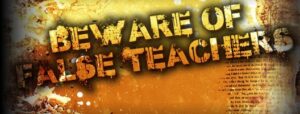
Wanted: Dead or Alive
Amazon recently offered a film, free of charge to their Prime members, entitled, “Life to Afterlife: Mom, Can You Hear Me?” The 2 ½-hour documentary follows seventeen parents, all of whom claim to have made a connection with their children in the afterlife.
That such a show was produced does not surprise me, nor does the idea that there are parents out there seeking this type of “comfort.” What came as a genuine shock to me is how open and supportive CHRISTIANS have been to this movie and its dangerously unbiblical contents.
Yahweh does not simply offer a gentle warning against consulting the dead—He blatantly tells us in His Word that this practice is repulsive to Him. Elsewhere, He calls it an abomination and a detestable practice.
And yet, even as we speak, grieving Christians are watching this film (and others like it) and seriously considering giving it a try. Others are, to their credit, praying in the midst of their confusion about it, asking God whether or not such a thing would be okay.
Brothers and sisters, if any of you find yourself at this crossroads right now, I beg of you to take pause. There is no need to ask God to answer a question if the answer is already clearly (and repeatedly) answered already. The Scriptures tell us over and over again to not consult with medium, psychics, spiritists, or those who consult the dead.
No matter what your pastor tells you, no matter how many rainbows you see in the sky, or how many friends send you an unsolicited Facebook post, “ten seconds after I prayed!”
These are NOT YOUR ANSWERS!
To those who believe in, and who have put their hope in, Jesus Christ, YOUR answers will be in Scripture; and Yahweh will never contradict His own Word.
But….
“Proof” Texts
There’s always a “but.” Even with something as final as death, we are always striving to find a loophole—a way out—and the human heart has an insatiable ability to wiggle its way out of just about any biblical “dead end” that it finds itself in—much to our own regret and detriment..
In this section, we will explore some of the texts that people use to justify “Christian necromancy.”
Justification #1
“But my loved one isn’t dead—they are alive in Christ!”
This escape clause is supposedly found in 2 Corinthians 5:8, which states, “To be absent from the body is to be present with the LORD.”
A study of the Greek words used in this verse indicate that “absent” (ekdémeó; ἐκδημέω) means, “to be away from home.” And the word for “present” (endémeó; ἐνδημέω) means, “to be in one’s own country.” This verse, like they say in the realty world, is all about location, location, location! “Indeed, we are told repeatedly in Scripture that believers in Christ are not of this world, aliens, strangers, and pilgrims (John 15:18-19, John 17:16, Philippians 3:20, Hebrews 11:13-16, 1 Peter 2:11).
According to the verbiage of 2 Corinthians 5:8, “Alive” simply means we are still on our pilgrim journey; while “dead” means we have found our way back to the home of our spiritual heritage. But here’s where tradition and theology have injected themselves into the text.
There is no evidence anywhere within that verse that indicates the state of awareness that those who are “present’ with the LORD are currently in. In other words, if I am under general anesthesia, getting my wisdom teeth pulled, I am present in the room with my oral surgeon; but I am not awake, alert, aware of, or interacting with him. If I am asleep in the car while my dad is driving me to the cabin, I am present in the car with my dad; but I am not awake, alert, aware of, of interacting with him.
We are assuming that being “present with the LORD” means we are awake, alert, conscious, aware, and interacting with Him—but it is an assumption—the text does not indicate one way or the other. Maybe the dead are “awake and aware” in the presence of the LORD, maybe they aren’t. We simply do not know.
Justification #2
The John 11 passage (the raising of Lazarus from the dead) is another, I believe, grossly misunderstood passage. Countless sermons have been preached on Jesus’ choice of words when He tells His disciples that Lazarus is “not dead” but merely “sleeping.” This is a head scratcher because poor Lazarus is taking this refreshing little snooze whilst wrapped in burial linens from the inside of a sealed tomb.
Furthermore, when Martha correctly identifies Jesus as the one who will one day (in the future) raise the dead on the last day, Jesus appears to correct her. He tells her, “I AM the Resurrection,” which is taken by many to mean that resurrection can occur anytime and anywhere He chooses—like right now—BOOM! “Lazarus, Come forth!”
But I do not believe that Jesus is correcting Martha’s theology here. His previous and very intentional choice of words (within the context of His omniscience) was that Lazarus (the guy wrapped in grave clothes, cold as ice in a tomb) was merely sleeping.
And indeed, Jesus “woke him up” and Lazarus enjoyed a brief reprieve after this miraculous revivification—but fact is, at some point later, he died again—and that time, he was in the grave to stay.
Had Lazarus truly been resurrected, he would still be alive today. So, Christ’s use of the word “sleep” was His all-knowing differentiation between (1) a temporal resuscitation of a corpse to life (that would die and be buried again a second time); and (2) the final resurrection where the soul, put into a new incorruptible body, that would, from that point on, live forever.
This would indicate to me that all of our precious loved ones who have died are not “alive” right now (in the sense we mortal humans would define it) but are in fact “asleep” (this is where the phrase “rest in peace” originates).
Again, I am not making a call here on their conscious or unconscious state—I am merely making a statement about their “right now” state of sleeping (i.e. “not yet resurrected); versus the whole and final resurrection that will not occur until Christ returns.
But, setting aside all of the semantics between the words “life” and “death”—perhaps an easier way to understand Yahweh’s exhortations to mankind to NOT consult with the dead would be better explained thusly: there is a physical/earthly realm where human beings exist; and there is a heavenly/spiritual realm where spirits/angels/demons/gods/and humans who have “passed over” exist.
We are
forbidden to consult with (talk to/communicate with) those that reside in
the spiritual realm. So, whether they are “alive” or “dead” or “human” or “angels”
is of little consequence—if they have a heavenly zip code, we are to stop
sending them mail.
Justification #3
Another technicality people cite is found in Mark 12:27, where Mark quotes Jesus as saying, “He [Yahweh] is not the God of the dead, but of the living.”
The context of Mark 12:18-27 is the resurrection of the dead (that will occur at the time of Jesus’ second coming.) Jesus is addressing a group of Sadducees—a sect of rabbinical Judaism that denied the resurrection of the dead. Jesus was not making a paranormal statement regarding the present animated state of the dead, but rather, was offering an apologetics to a group of skeptics that, regardless of their wayward theology, the dead in Christ would indeed one day rise again.
Familiar Spirits
“When you enter the land which the Lord your God is giving you, you shall not learn to imitate the detestable (repulsive) practices of those nations. There shall not be found among you anyone who…casts a charm or spell, or a medium, or a spiritist, or a necromancer [who consults the dead]. For everyone who does these things is utterly repulsive to the Lord; and because of these detestable practices the Lord your God is driving them out before you.”
Deuteronomy 18:9-12
In the King James Version, verse 11 (in lieu of the word medium) uses the phrase, “one who consults with familiar spirits.” The phrase “familiar spirits” is being used in this context as a synonym for “the dead.”
We understand “the dead” to be our loved ones who have passed on. But, Moses, under the inspiration of the Holy Spirit understands that necromancers are not calling up our deceased loved ones, they are calling up “familiar spirits.”
So, what exactly is a “familiar” spirit?
“Sorcerers or necromancers, who professed to call up the dead to answer questions, were said to have a “familiar spirit” (Deuteronomy 18:11; 2 Kings 21:6; 2 Chr 33:6, Leviticus 19:31; 20:6, Isaiah 8:19; 29:4). The word “familiar” is from the Latin familiaris, meaning a “household servant,” and was intended to express the idea that sorcerers had spirits as their servants ready to obey their commands.”[1]
In other words, the necromancer is not calling up your dead loved one, they are calling up a spirit—a demonic Cyrano de Bergerac—who feeds the medium information about the deceased person’s life and family history.
“’Familiar spirits’ – sounds kind of friendly. In America today, psychic spiritualism is gaining popularity. In television and movies there is a plethora of angels, ghosts, witches, wizards, fortune tellers, psychics, and mediums, all of which are presented in a friendly, familiar way. But make no mistake, this is a deadly manifestation of evil, which the Bible denounces, forbids, and duly warns of its consequences. God said through the prophet Isaiah: “When they shall say unto you, Seek unto them that have familiar spirits, and unto wizards that peep and mutter, should not a people seek under their God? for the living to the dead?” (Isaiah 8:19). Yet many are fooled by their “gift”, which is actually a familiar spirit. Familiar spirits are knowledgeable, because their master, Satan has been around for ages. They know history, because they have existed during it. Also, many prefer to attach themselves to families. They know a family’s history well, so when a familiar spirit prompts the medium to say: “Did your Aunt Lucy have a cat named Shakespeare?”, it is not because they are channeling — speaking to that dead person and relating messages from him/her, but because they existed during Aunt Lucy’s life and observed things. Warning: These open a person up to the demonic! Many have a familiar spirit working with them. None of these are “good spirits” from God. They are impersonating, imitating spirits and often have knowledge of the dead, because they have observed them during their lifetime.”[1]
Conclusion
Satan is a BULLY. He preys on the weak, the hurting, and the vulnerable. His favorite victims are people with special needs, widows, the elderly, orphans, children, and those in deep grief.
For those of us who have ever experienced a season of grief, we know that it is terrifying, painful, and confusing. The carpet of reality is ripped out from underneath us. It can feel like we are spiraling backwards through interstellar space—our screams silenced within its vacuum. The depths of loss and hopelessness are indescribable. The brain is so bogged down processing the grief that getting up out of bed, or remembering where you set your keys or cell phone, become impossible tasks.
The Adversary—the prowling lion—is ever seeking an opportunity to bring us down. He often waits years—decades—for our defenses to be down, for a chance to deceive us when we are most vulnerable.
It is during these times that he sends out his agents—familiar spirits that parade around impersonating our dearly loved family members. This is nothing short of identity theft of the unforgivable nth degree.
If a grave robber unburied our loved one in the middle of the night and desecrated their body—we would be LIVID. We would hunt those twisted crooks down and have the judge throw the book at them. But nefarious spirits who pass back and forth between the earthly and the spiritual realms are doing this exact same thing when they show up at the end of your bedpost at night impersonating your dead loved one.
Please be sober-minded and vigilant during your season of grief, brothers and sisters! Just because something “works” does not mean it is a toy or that it should be trifled with. A Ouija board “works”—a semi-automatic machine gun “works”—an electric chair “works”—but that doesn’t mean we toss caution to the wind and start trifling with them.
Just because something brings us joy, comfort, hope, or temporary relief from our pain, doesn’t mean it is advisable or good. Alcohol, food, and shopping all have the capacity to bring temporary comfort and relief from pain, but when done in excess, they lead to addiction, obesity, debt, and destruction. Promiscuous sex and taking drugs “feels good” but again, both practices are destructive to mind, spirit, body, and soul.
Grieving brothers and sisters, I feel your pain and agonize with your loss (I lost my best friend—my mom—seven years ago). The rift in my life is irreplaceable. The loss is unfillable. But I have set all my hopes upon Jesus Christ, who is able to replace and refill all that was lost upon my mother’s passing. My hope is in His coming and in the resurrection–not in communicating with demons and spirits who have hijacked my dear mother’s image, memories, and voice in order to trick me into opening demonic gateways into my life.
To anyone who is undergoing this type of temptation right now (the temptation to make contact with a loved one who has passed on to the other side) I beg of you to rethink it, trust wholly in the loving warnings in Scripture to flee from it, and to seek out a praying friend or pastor to help you to find biblically acceptable avenues of comfort and recovery.
It might not happen today. It might not happen tomorrow. But Jesus Christ–the only mediator between the spiritual realm (God) and man–has promised to wipe away every tear from our eyes. Revelation 21:4 tells us, “There will be no more death or mourning or crying or pain, for the old order of things have passed away.” Hallelujah! THIS is our hope!
[1] https://www.oneplace.com/ministries/sound-of-faith/read/articles/familiar-spirits-15293.html
[1][1] https://www.biblestudytools.com/dictionary/familiar-spirit/


